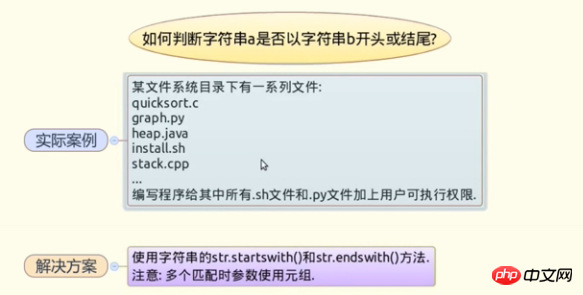
In [39]: ll
total 0
-rw-rw-r--+ 1 yeyilu 0 Sep 17 06:42 a.sh
-rw-rw-r--+ 1 yeyilu 0 Sep 17 06:42 b.py
-rw-rw-r--+ 1 yeyilu 0 Sep 17 06:42 c.h
-rw-rw-r--+ 1 yeyilu 0 Sep 17 06:42 d.java
-rw-rw-r--+ 1 yeyilu 0 Sep 17 06:42 e.py
-rw-rw-r--+ 1 yeyilu 0 Sep 17 06:43 f.cpp
-rw-rw-r--+ 1 yeyilu 0 Sep 17 06:43 g.sh
-rw-rw-r--+ 1 yeyilu 0 Sep 17 06:43 h.c
In [42]: import os, stat
In [43]: os.listdir('.')
Out[43]: ['g.sh', 'e.py', 'c.h', 'f.cpp', 'd.java', 'h.c', 'a.sh', 'b.py']
In [45]: s = 'g.sh'
In [46]: s.endswith('.sh')
Out[46]: True
In [47]: s.endswith('.py')
Out[47]: False
In [48]: s.endswith(('.sh','.py'))
Out[48]: True
In [49]: s.endswith?
Type: builtin_function_or_method
String form: <built-in method endswith of str object at 0xb6041c40>
Docstring:
S.endswith(suffix[, start[, end]]) -> bool
Return True if S ends with the specified suffix, False otherwise.
With optional start, test S beginning at that position.
With optional end, stop comparing S at that position.
suffix can also be a tuple of strings to try.
p = ('a.py', 'b.sh', 'c.java', 'c.h', 'd.cpp', 'g.h','1.sh')
t = ('a.py', 'b.sh', 'c.java', 'c.h', 'd.cpp', 'g.h','test.java')
In [92]: def filter_ord(*y):
res = []
for x in y:
if x.endswith(('.java','.sh')):
res.append(x)
return res
....:
In [94]: filter_ord(*t,*p)
Out[94]: ['b.sh', 'c.java', 'test.java', 'b.sh', 'c.java', '1.sh']
方法一:
In [112]: res = []
In [113]: for x in os.listdir('.'):
.....: if x.endswith(('.sh','py')):
.....: res.append(x)
.....:
In [114]: res
Out[114]: ['g.sh', 'e.py', 'a.sh', 'b.py']
方法二:
In [53]: list(filter(lambda x:x.endswith(('.sh','.py')),os.listdir('.')))
Out[53]: ['g.sh', 'e.py', 'a.sh', 'b.py']
方法三:
In [54]: [name for name in os.listdir('.') if name.endswith(('.sh','.py'))]
Out[54]: ['g.sh', 'e.py', 'a.sh', 'b.py']
In [55]: os.stat('e.py')
Out[55]: os.stat_result(st_mode=33204, st_ino=277206, st_dev=2049, st_nlink=1, st_uid=1000, st_gid=1000, st_size=0, st_atime=1505655776, st_mtime=1505655776, st_ctime=1505655776)
In [56]: os.stat('e.py').st_mode
Out[56]: 33204
In [57]: oct?
Type: builtin_function_or_method
String form: <built-in function oct>
Namespace: Python builtin
Definition: oct(number)
Docstring:
Return the octal representation of an integer.
>>> oct(342391)
'0o1234567'
In [58]: oct(os.stat('e.py').st_mode)
Out[58]: '0o100664'
In [64]: os.chmod('e.py',os.stat('e.py').st_mode | stat.S_IXUSR)
In [65]: ll
total 0
-rw-rw-r--+ 1 yeyilu 0 Sep 17 06:42 a.sh
-rw-rw-r--+ 1 yeyilu 0 Sep 17 06:42 b.py
-rw-rw-r--+ 1 yeyilu 0 Sep 17 06:42 c.h
-rw-rw-r--+ 1 yeyilu 0 Sep 17 06:42 d.java
-rwxrw-r--+ 1 yeyilu 0 Sep 17 06:42 e.py*
-rw-rw-r--+ 1 yeyilu 0 Sep 17 06:43 f.cpp
-rw-rw-r--+ 1 yeyilu 0 Sep 17 06:43 g.sh
-rw-rw-r--+ 1 yeyilu 0 Sep 17 06:43 h.c


